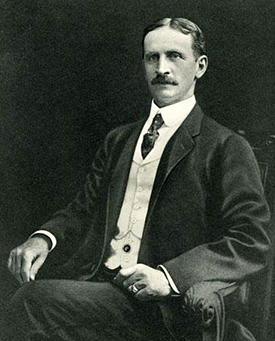
United States v. American Tobacco Company was a 1911 U.S. Supreme Court case in which the Court found that a large number of persons and corporations-including North Carolinians James Buchanan Duke, George W. Watts, and Benjamin N. Duke, as well as the American Tobacco Company, the R. J. Reynolds Tobacco Company, and Blackwell's Durham Tobacco Company-had violated the federal Sherman Antitrust Act of 1890 by seeking to monopolize practically all sectors of the tobacco industry. The ruling was among the earliest Supreme Court decisions applying the Sherman Act.
The American Tobacco Company was organized in 1890 by James B. Duke, a member of W. Duke, Sons and Company of Durham. At the time, the Dukes' Durham operation was already a leader in the emerging business of manufactured cigarettes. The new American Tobacco Company, capitalized at $25 million, allied five large existing tobacco companies, one of which was W. Duke, Sons and Company. From the moment it was formed, the American Tobacco Company possessed a near monopoly on sales of manufactured cigarettes. By 1908, when the government began the federal lawsuit that led to the Supreme Court decision, the company had extended its monopoly in the United States to most other branches of the tobacco industry, including plug tobacco, smoking tobacco, snuff, and little cigars.
The antitrust case was commenced in a New York federal court. After that court held that the American Tobacco Company was guilty of violating the Sherman Act, but found other defendants not guilty of any violation, both the United States and the American Tobacco Company appealed. The Supreme Court effectively extended the finding of guilt to all parties and remanded the matter to a federal circuit court in New York, with instructions to dissolve the combination. In November 1911 the circuit court, seeking to destroy unified control over the affected branches of the tobacco industry, divided the monopoly's assets among several corporations, including a new American Tobacco Company, the Liggett and Myers Tobacco Company, the P. Lorillard Company, and the R. J. Reynolds Tobacco Company.
The Supreme Court's ruling had two particularly significant results for North Carolina. First, James B. Duke's association with the American Tobacco Company ended in 1911. Duke's business attention was partly redirected to the development of hydroelectric power in North Carolina and South Carolina through the Southern Power Company, which had been incorporated in 1905. Second, the R. J. Reynolds Tobacco Company, in 1913, introduced its Camel brand, which eventually captured a substantial share of the cigarette market.
The 1911 Supreme Court decision did not end monopolistic practices among cigarette manufacturers. By 1946 the R. J. Reynolds Tobacco Company, the American Tobacco Company, and the Liggett and Myers Tobacco Company were once again before the Supreme Court. The Court affirmed a conviction against them for violating the Sherman Act by unlawful price fixing and monopolizing both the purchase of raw tobacco and the marketing of cigarettes.